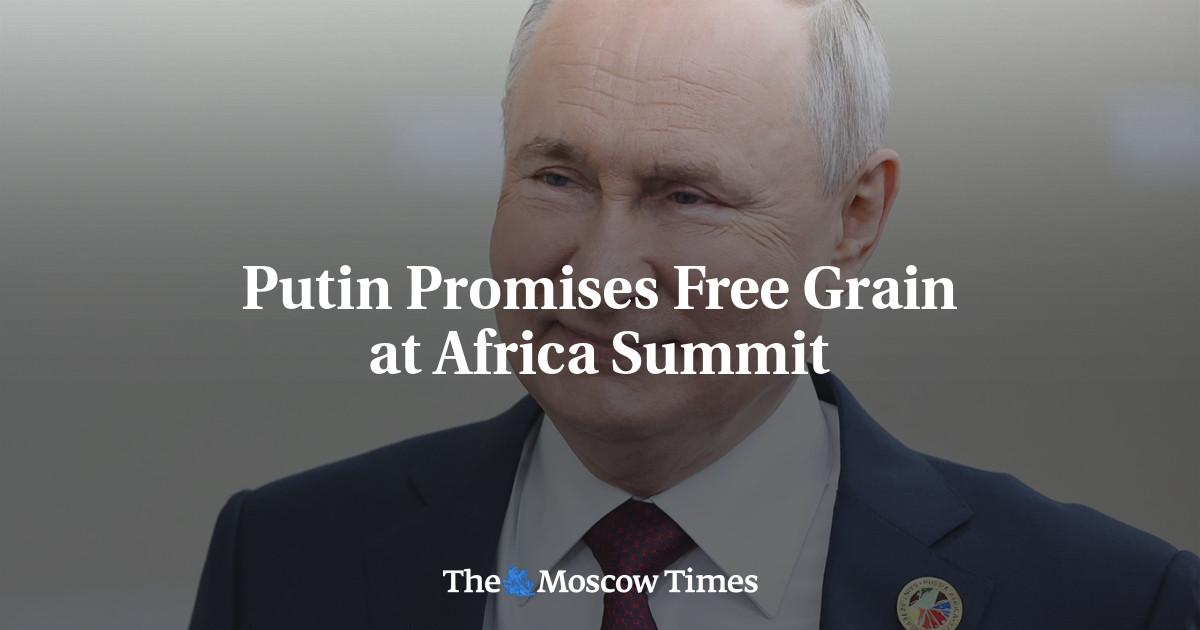
Russian President Vladimir Putin on Thursday offered free grain to six poor African countries as he launched a summit with leaders from the continent days after withdrawing from the Ukraine grain export deal.
The two-day summit in Putin’s native St. Petersburg is being scrutinized as a test of his support in Africa, where he retains support despite international isolation sparked by his military intervention in Ukraine last year.
Russia last week refused to extend a deal under which Ukrainian grain exports passed through the Black Sea to reach global markets, including Africa, easing pressure on food prices.
In a keynote address at the summit, Putin promised to send grain to six African countries.
“In the coming months we will be able to ensure free supplies of 25,000 to 50,000 tons of grain to Burkina Faso, Zimbabwe, Mali, Somalia, Central African Republic and Eritrea,” Putin said.
Over a year, the grain deal allowed around 33 million tons of grain to leave Ukrainian ports, helping to stabilize global food prices and avert shortages.
U.S. Secretary of State Antony Blinken pressed African leaders attending the summit to demand answers about the grain disruptions that have propelled poorer nations towards crisis.
“They know exactly who’s to blame for this current situation,” Blinken said of the leaders.
“My expectation would be that Russia will hear this clearly from our African partners,” he said Thursday during a visit to New Zealand.
Seventeen African leaders including South African President Cyril Ramaphosa are expected at the Russia-Africa summit taking place on Thursday and Friday.
The Kremlin has accused Western countries of trying to prevent African states from participating in the summit.
The summit is the second of its kind after an inaugural one held in 2019 in Sochi, southern Russia.
‘Find common ground’
On Friday, Putin is set to discuss Ukraine during a working lunch with a group of African heads of state, according to the Kremlin.
The situation in Niger, where President Mohamed Bazoum has been detained by soldiers following a coup bid, is “actively” discussed on the sidelines of the summit, the Kremlin spokesman said.
“It will likely be discussed in some way during the central events of the summit that will take place tomorrow. And today too,” Dmitry Peskov added.
The summit will be an opportunity to exchange views on key issues, according to Vsevolod Sviridov of the Center for African Studies at HSE University.
Since the coronavirus pandemic and the launch of the military offensive in Ukraine, “the framework in which Russia and Africa interact has seriously changed,” Sviridov told AFP.
“It is necessary to find common ground, to explain to each other positions on topical issues, for example, the grain deal,” he added.
Putin has already held talks Wednesday with Ethiopian Prime Minister Abiy Ahmed and Egyptian President Abdel Fattah al-Sisi, praising their joint energy projects.
Representatives of African states continued to arrive in the former imperial capital ahead of the summit, including delegations from Mozambique and Libya, Russian state news agency TASS said Thursday.
Since the start of the Ukraine offensive, Russia has sought to strengthen diplomatic and security ties with Africa.
Russian Foreign Minister Sergei Lavrov has been on two tours of the continent so far this year, trying to win over leaders to Moscow’s side by emphasizing Russia’s stand against Western “imperialism.”
Russia’s Wagner mercenary group has been a major player in the security sphere in Africa but its failed mutiny against Russia’s military leadership last month has cast doubt on the future of the group’s operations on the continent.
The summit in St. Petersburg comes a month ahead of a summit of leaders of the BRICS countries (Brazil, Russia, India, China and South Africa) due to take place in Johannesburg.
South Africa has said that Putin, who is the subject of an international arrest warrant for his actions in Ukraine, will not be attending in person.